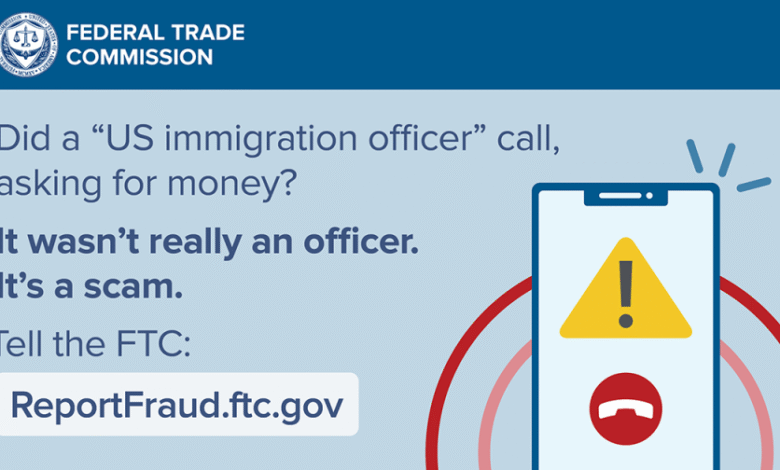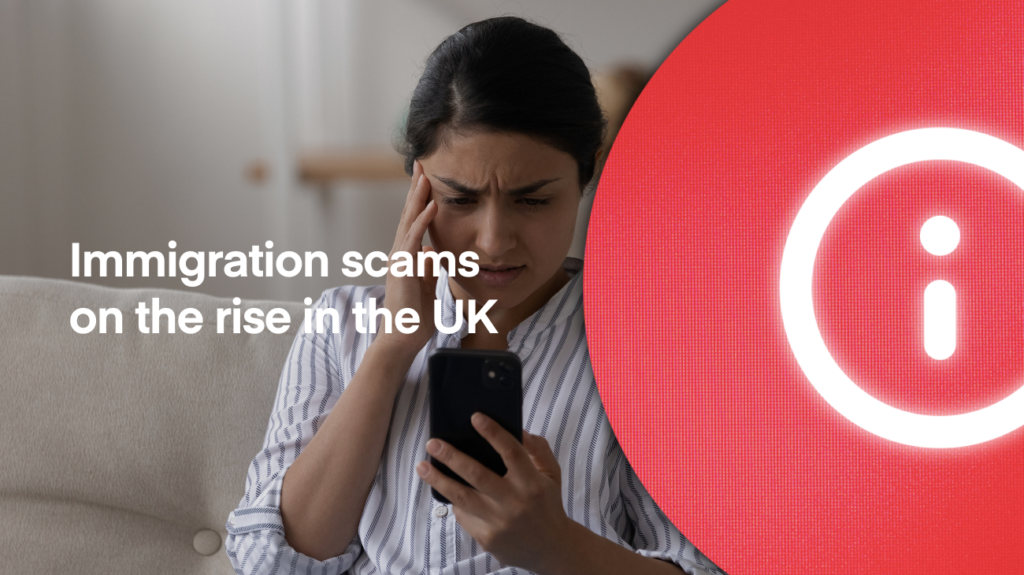Immigration Scam Calls – How to Identify and Protect Yourself

In today’s increasingly digital world, immigration scam calls have become a growing threat. Scammers target immigrants using fear, urgency, and manipulation, often pretending to be government officials from agencies like USCIS, ICE, or the Department of Homeland Security. The goal is to trick individuals into paying fake fines, fees, or providing sensitive personal information, including Social Security numbers, bank details, or passport information. The rise of these scams has left many immigrants vulnerable, particularly those who are new to the country or unfamiliar with government procedures.
Understanding the nature of these calls is critical. While legitimate government agencies communicate in structured and documented ways, scam calls rely on psychological pressure. They often involve threats of deportation, arrest, or legal action if the recipient doesn’t comply immediately. Recognizing the difference between real and fraudulent communication is essential for protecting yourself and your family.
This article is designed as a comprehensive guide to immigration scam calls. From understanding how these scams operate to recognizing warning signs, safeguarding personal information, and reporting incidents to the authorities, we’ll cover all aspects of this pervasive issue. By becoming informed, you can reduce the risk of falling victim and help others in your community do the same.
What Are Immigration Scam Calls?
Immigration scam calls are fraudulent attempts to exploit immigrants by impersonating government officials. These scams can take many forms, but most involve threats or urgent demands for money. Scammers often claim that the victim owes fees, has a pending deportation, or has won a visa lottery that requires payment for processing. The underlying tactic is always the same: generate fear to compel immediate compliance.
The perpetrators behind these calls often gather phone numbers from public records, online databases, or even previous scam interactions. Some scams are highly sophisticated, employing caller ID spoofing to appear as legitimate government numbers. Scammers may also send follow-up emails or text messages with official-looking documents to further convince victims of their authenticity.
Real-world examples highlight the ingenuity of these fraudsters. Some have impersonated USCIS officers, claiming that victims’ immigration status is at risk unless they pay a “processing fee” via wire transfer or gift cards. Others pose as immigration lawyers or law enforcement officers, threatening arrest for minor infractions. These schemes rely on fear, urgency, and trust in authority, which makes it crucial for immigrants to remain vigilant and verify any suspicious calls through official channels.
Signs of an Immigration Scam Call
Identifying immigration scam calls requires awareness of common red flags. One of the most obvious signs is the use of threatening or urgent language. Scammers often claim immediate legal consequences, such as deportation or arrest, to pressure victims into acting without thinking. They might also insist on secrecy, discouraging the recipient from consulting family members or trusted advisors.
Another warning sign is the request for personal or financial information over the phone. Legitimate government agencies rarely demand payment through unconventional methods like gift cards, wire transfers, or cryptocurrency. If a caller asks for such payment or requests sensitive details like Social Security numbers or bank account credentials, it’s almost certainly a scam.
Caller ID manipulation is another tactic. Scammers can make it appear as though the call originates from an official government number. They may also send emails or text messages with official-looking logos, forms, or legal-sounding language. These tactics are designed to create a false sense of legitimacy, making it even more important to verify any communication directly with government authorities before responding.
Finally, inconsistencies in communication can reveal scams. Poor grammar, unusual accents, or contradictory statements within the call are often giveaways. Paying attention to these details can help individuals differentiate legitimate communications from fraudulent attempts.
How to Protect Yourself
Protecting yourself from immigration scam calls begins with verification. Always confirm the identity of a caller by contacting the relevant agency directly using official phone numbers or websites. Never rely on contact information provided by the caller, as scammers often supply fake details.
It’s essential to never share personal or financial information over the phone. This includes Social Security numbers, bank account information, or passport details. Legitimate government agencies will not request sensitive information in this manner, nor will they demand immediate payment through unconventional methods.
Using technology can also help. Call-blocking apps, spam filters, and reporting suspicious numbers to your phone carrier can reduce the risk of repeated contact from scammers. Educating family members, particularly seniors or newly arrived immigrants, about these scams can prevent them from being targeted.
Finally, having a step-by-step action plan is invaluable. Document the call details, refuse any requests for payment, and report the incident to the appropriate authorities. Staying calm, informed, and cautious is the most effective defense against these sophisticated scams.
Reporting Immigration Scam Calls

Reporting is a crucial part of combating immigration scam calls. Several agencies handle these complaints, including the Federal Trade Commission (FTC), Immigration and Customs Enforcement (ICE), and local law enforcement. Reporting helps authorities track patterns, investigate perpetrators, and protect other potential victims.
When reporting a scam call, include as much information as possible. Document the phone number, time of the call, scripts used by the scammer, and any emails or texts received. These details can assist law enforcement in identifying and prosecuting the scammers. Many agencies also provide online forms for anonymous reporting, which encourages victims to come forward without fear of retaliation.
Government campaigns and awareness initiatives have increased in recent years, providing educational materials to help immigrants recognize scams. Participating in community outreach programs or workshops can further empower individuals to stay safe. By reporting incidents and spreading awareness, victims become advocates for their communities, preventing scammers from continuing their fraudulent activities.
Real-Life Stories and Case Studies
Stories from victims of immigration scam calls underscore the seriousness of the problem. For instance, a recent case involved a family receiving repeated calls threatening deportation unless they paid thousands of dollars via gift cards. Fortunately, the family verified the calls with official authorities and avoided financial loss.
Other cases show how scammers exploit fear and lack of knowledge. Some victims have lost money, personal information, or both, highlighting the need for vigilance and education. Law enforcement agencies have successfully prosecuted scammers in several high-profile cases, recovering funds and preventing further exploitation.
Sharing these stories serves as both a cautionary tale and a learning opportunity. By understanding how scams operate in real life, immigrants can better protect themselves and educate others in their communities. Awareness is a powerful tool against these fraudulent schemes.
Conclusion
Immigration scam calls represent a serious threat to immigrant communities, exploiting fear, trust, and vulnerability. Awareness, verification, and reporting are the keys to staying safe. By understanding the tactics used by scammers, recognizing warning signs, and following best practices for protection, individuals can safeguard themselves and their families. Sharing knowledge and remaining vigilant ensures that these fraudulent activities are less effective and empowers communities to resist deception. Staying informed is the best defense.
Frequently Asked Questions (FAQs)
What should I do if I receive an immigration scam call?
Verify the caller’s identity and report the call to authorities. Never provide personal information.
How can I tell if a call is from a legitimate government agency?
Contact the agency directly using official numbers or websites to confirm.
Are immigration scam calls illegal?
Yes, these calls constitute fraud and impersonation of government officials.
Can I report a scam call anonymously?
Many agencies allow anonymous reporting to encourage victims to come forward.
How do scammers get my phone number?
They may obtain it from public records, online data, or previous scams.
What are common payment methods used by scammers?
Gift cards, wire transfers, cryptocurrency, and other untraceable methods.
Are certain immigrants more targeted than others?
New arrivals, non-English speakers, and senior immigrants are often targeted.
Can reporting a scam prevent future attacks?
Yes, reports help authorities track scammers and protect others.
What official resources can help me verify a call?
USCIS, ICE, the FTC, and local law enforcement are reliable resources.
How widespread are immigration scam calls in 2025?
Reports indicate an increase, with scammers adapting to new technologies and targeting diverse communities.
You May Also Read: Spike Lighter




